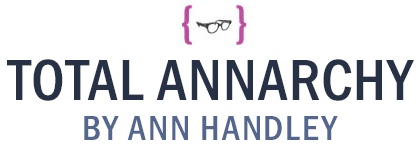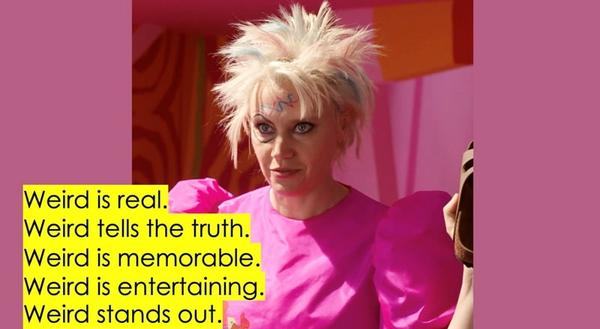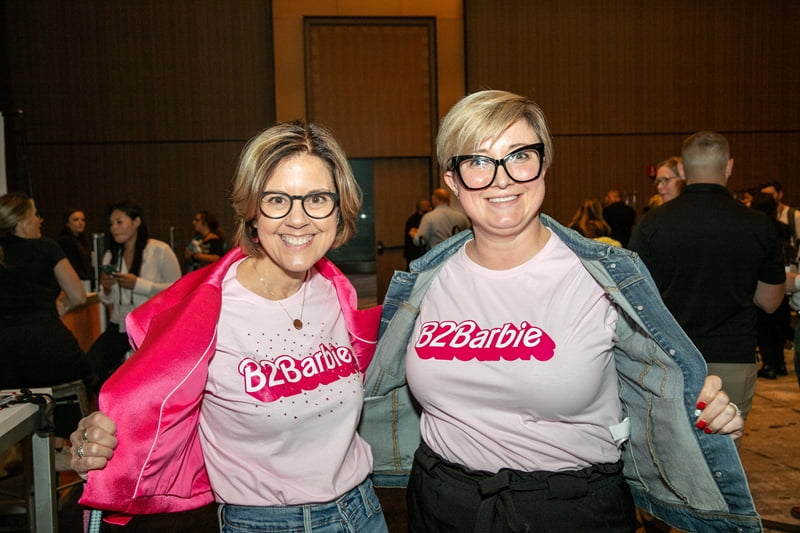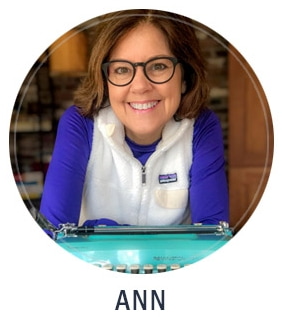Hi, Gourd-geous.
It's been a heavy few weeks on nearly every front. Professional. Personal. World. (To paraphrase my friend Michelle Martello.)
I whiffed on my last planned newsletter to you, a fortnight ago. My brain and body needed a break.
But I'm back. Hi. Good to see you today.
Side note: Want to know how much impact your work has? Don't show up when people expect you will. You will find yourself in one of two camps:
- Camp Crickets. Motto: No one notices when you're gone. (Uh-oh. Work on that.)
- Camp Checking-In. Motto: Everyone notices when
you're gone: You okay? All good? (Carry on. You're doing great!)
I'm grateful to know my tent is in #2. Thank you for the wellness checks, everyone.
* * *
Last week I shared something on LinkedIn that I want us to unpack together here.
It resonated. Yet a few people disagreed with my post; a few others told me privately
that they didn't quite get it.
I don't mind when people disagree with me. But I hate it when I'm misunderstood. (It's one of the main reasons I write—to feel less alone. Maybe you, too?)
So first I'll share the post. Then I'll share why I'm sharing here a post I already shared there.
(Are you still following? I had to type that 3 times to make sure I got it right lol.)
Anyway. Here's the setup:
I got this message from Jess Cook following the MarketingProfs B2B Forum, which took place in early October in Boston. Jess wrote:
"I just wanted to say thank you for your no-holds-barred keynote at last week's MarketingProfs B2B Forum. The content of your talk was
incredible (no surprise) but what stood out to me was how you are 100% authentically YOU on stage. I've been posting on LinkedIn, guesting on podcasts, and hosting my own podcast now for the past year or so and I often struggle with how much of me I should put out there. (Am I too quirky?! Will people be ok with that?!)
"It was so refreshing and fun to
see you up there with your bold suit, your jokes, your energy, your gestures ... thank you for that. It makes me want to put more of ME into everything I do. Best, Jess."
In Boston I talked about how Weird Barbie is our Hero in Marketing.
In the Barbie movie,
Barbieland is populated with neat, perfect Barbies dressed in pastels. Except for one who stands apart: Weird Barbie. (Played delightfully by Kate McKinnon.)
Weird Barbie has been played with too roughly. Her hair has been cut by nail clippers. Someone has taken a Sharpie to her face. She smells like Basement.
Most of the others are repulsed by her. Yet they also turn to her whenever they need advice. Her damage is what makes her one of the most interesting and complex Barbies in the movie, the one that doesn't fit with the rest.
You could say she's a cliche—the outsider whose differences are yet to be accepted by the whole. But she's more than that... She's
memorable.
On LinkedIn, I said: We need more Weird Barbie.
One of the things I've learned since the dawn of the Internet and in one jillion Internet years of writing and creating content and speaking on stages... is that the weirder you are, the more your work resonates.
I'm not talking unhinged weird... I'm talking standing out. Showing your personality. Your point of view.
Weird gets a bad rap—like it's a negative thing. It's not. Weird is good. Because weird is real. Weird tells the truth. Weird is memorable. Weird is entertaining. Weird stands
out.
* * *
Weird as in Bizarre? Weird as in show up at work in a chicken costume and tap dance like the floor is on fire?
Weird like the unexplored shadows of Dali's worst nightmare? (Or DALL-E's, I suppose.) Weird as in gimmick? Weird in place of competent?
Oof. No. I felt Weird Barbie herself tapping me on the shoulder.
"You did me dirty," Weird Barbie whispered. "It's not just about Weird. It's about..." (She waves her plastic hand around, dramatically.) (Albeit stiffly, without a working wrist.) "It's also about... other things."
Here's the deal: In Barbieland, Weird Barbie is characterized as "weird." That's what happens when you're unlike others. She owns it—the marked-up face.
The jacked-up hair. The basement smell. The different branding.
But this isn't Barbieland. This is the real world. Here in the real world, Weird Barbie is part of all of us.
Weird...? Or maybe: Imperfect. Honest. Unexpected. And always... memorable.
It's not just the branding. It's not just the weird. It's her positioning.
It's the way that the community relies on her for guidance. It's the way she's earned their trust. It's the way that only she can help when the tiny Barbie-sized chips are down.
In a world where Marketing can seem plastic and sanitized and not of this world... Weird Barbie is anything but.
Wait. Did I say Marketing can seem sanitized? I meant Barbieland! 😉
Weird Barbie is
the one her community trusts to help them get to the truth. She's the one with perspective. She's their guide.
* * *
So that's what I wish I said in that post, and what I'm clarifying now: Weird Barbie as Modern Marketing Hero is a
metaphor, not a prescription.
And I wish I called out something else, which feels particularly fitting in the Age of AI:
What is "weird," anyway?
Weird
comes from the Old English noun wyrd—meaning "fate."
"Fate." So heavy a word. But in the context of AI, maybe we need to pay attention to our Marketing fate.
What sets you apart as a marketer or writer in the age of AI?
It's your own stories. Your own history. Your own perspective and point of view. What you say and the way you say it. That's your weird. That's your fate.
We each need to choose our fates. How will you show up? How will you bring your whole self to your role? Your career? Your life?
* * *
We're at an interesting point right now, you and I.
In a world where an abundance of content and an abundance of choice means that there are an infinite number of places to go for
answers. The question becomes: How do you build trust and affinity with one person, so they choose you first? How do you make sure they seek out YOU?
How do you make your From line matter more than your Subject Line?
The answer is to root around internally for your own Weird Barbie. Imperfect. Honest. Unexpected. And always... memorable.
Because I can't leave us without a few mentors for our Weird Barbie world, let's celebrate a few great tenets of Weird and Wonderfully Memorable Marketing:
- Tell stories that lead with emotion. Like Alzheimer's Research UK.
- Develop your brand voice. Like this post from the National Park Service.
- Be educational AND entertaining. Like this product explainer from Notarize.
- Reimagine the expected. Jay Schwedelson explains the thinking that fuels Guru
Conference, a virtual email marketing extravaganza and possibly the most unusual free virtual program in Marketing. (A hot wing contest? Live TikTok dance party? Live only? No On-Demand...?!)
(By the way, I'm speaking at the conference. So is Martha Stewart.) (Yes, that Martha. Reg. link below under EVENTS.)
👉 Related: I also love how Jay writes
in his post, "I had this idea of re-imagining virtual events floating in my head for a while.... I know you have an idea in your head for something awesome that you have been wanting to do. Just do it. Regret is so much worse than failure. Life is short."
If that's not a we-ride-at-dawn, Call-to-Arms for Weird Barbie (call-to-plastic-arms?)... well, I don't know
what is.
* * *
Put more YOU into everything you do. It's the only way you—and marketing itself—will thrive. And it's the only way to shape your own fate.
EVERYBODY WRITES WRITING TIP OF THE FORTNIGHT
What holds a reader's attention? Three
things:
- How easy something is to understand. (Social scientists call this "processing ease," which makes me think of words being ground into lunch meat and sold at the deli for $3.79/lb.)
- How much something taps into emotions—especially suspenseful writing that makes us feel anxious or excited and (as a result) more awake and alert.
- How well we
use concrete and specific words: Phone vs. technology; a Labradoodle named Otter vs. dog; "bad haircut" vs. "cut with nail clippers."
So does that mean you should always use simple language? We should always leverage anxiety? Always-always?
No. Because here's the
interesting thing: The tone and language that capture attention are not necessarily the same tone and language that encourage customers to buy a product, writes Thomas McKinlay. He adds:
- Brands
positioning themselves as sophisticated & elegant (like luxury brands) may find simple words and short sentences don't reflect the aspirations of their customers.
- Uncertainty generates suspense and keeps readers hooked. Sure. But it may not work for brands that promote their reliability, strength, timelessness.
👉 More writing advice: Buy the new
edition of Everybody Writes here.
👉 Related: For healthcare marketers: Plain language really is your friend.
DEPARTMENT OF SHENANIGANS
A whale of a vacation.
SELECT EVENTS






